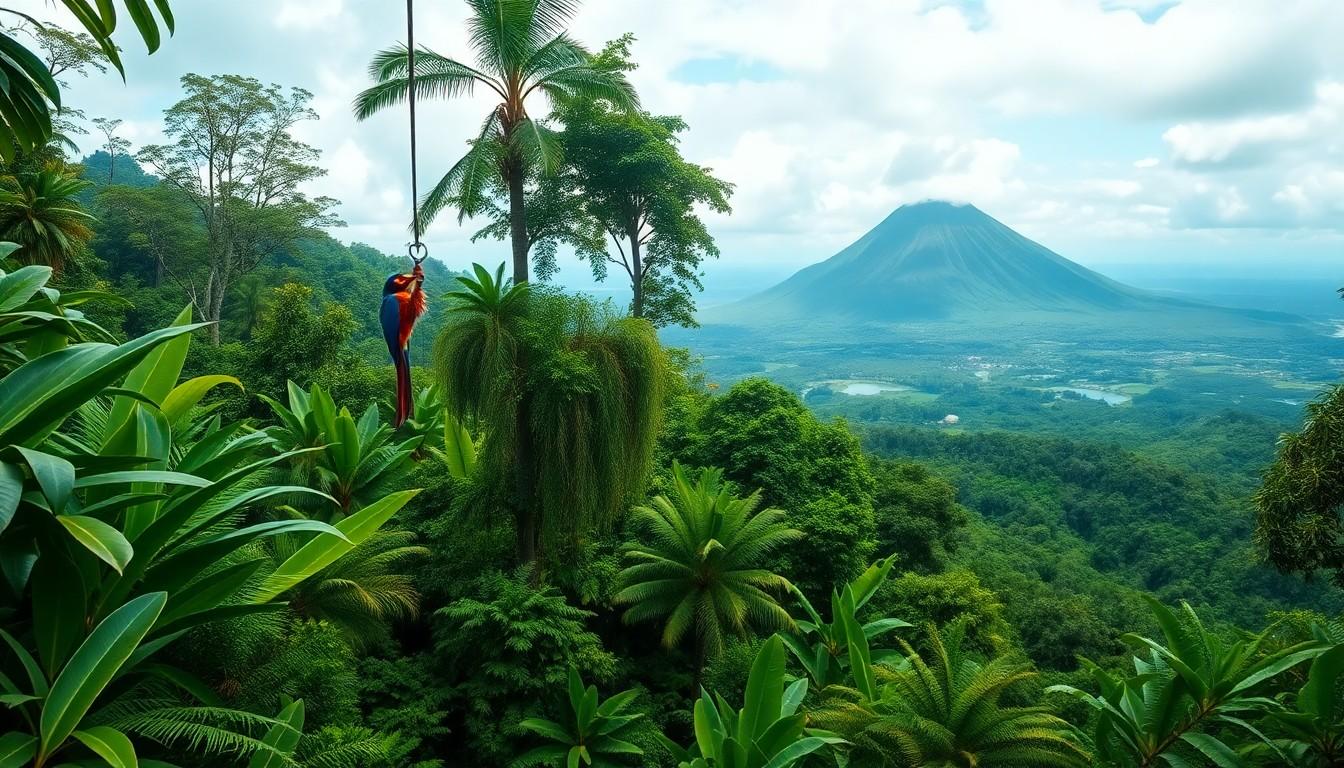Imagine swapping your mundane office view for a breathtaking sunrise over the Amazon rainforest or the serene sound of waves lapping against a pristine beach in the Maldives. Eco tourism isn’t just a travel trend; it’s a passport to adventure that also gives Mother Earth a big, warm hug. With the world’s natural wonders at our fingertips, exploring eco-friendly destinations can transform a simple vacation into a mission to preserve our planet.
From lush jungles to vibrant coral reefs, eco tourism destinations offer unforgettable experiences while promoting sustainability. Travelers can indulge their wanderlust without guilt, knowing they’re supporting conservation efforts and local communities. So grab your reusable water bottle and put on those hiking boots. It’s time to discover the planet’s most enchanting spots where adventure meets responsibility.
Eco Tourism Destinations in the World
Eco tourism focuses on responsible travel to natural areas, conserving the environment and improving the well-being of local communities. This form of tourism attracts individuals seeking immersive experiences in pristine landscapes while supporting conservation efforts. Adventurers can explore diverse ecosystems, from rainforests to coral reefs, engaging with the unique wildlife and flora.
Travelers enjoy opportunities to participate in conservation activities, such as wildlife monitoring or habitat restoration. Each experience contributes directly to local ecological preservation. Many destinations emphasize sustainability, ensuring minimal environmental impact while promoting cultural exchange.
Numerous accommodations, such as eco-lodges, prioritize eco-friendly practices by using renewable energy sources and offering locally sourced meals. Sustainable transportation options, including bicycles and electric vehicles, further reduce carbon footprints during trips.
Travelers can embrace eco tourism in various regions around the globe. Countries like Costa Rica and New Zealand showcase natural beauty and commitment to eco-friendly practices. Locations within the Cape Verde islands or the Galápagos offer both adventure and conservation focus. Engaging with local communities enhances cultural respect and offers insights into traditional practices.
Ultimately, eco tourism creates a balance between exploring the world’s stunning landscapes and ensuring their preservation for future generations. It empowers individuals to make conscientious travel choices that foster sustainability while enjoying the wonders of nature.
Top Eco Tourism Destinations in the World

Eco tourism offers unique experiences in stunning environments while promoting conservation efforts. Here are some of the top eco tourism destinations around the globe.
Destination 1: Costa Rica
Costa Rica stands out for its rich biodiversity and commitment to sustainability. National parks cover about 25% of its land, fostering conservation of species like the resplendent quetzal and howler monkeys. Visitors often engage in activities such as zip-lining through rainforests and exploring volcanic landscapes. Eco-friendly lodges provide opportunities for sustainable dining, sourcing ingredients locally. Birdwatching, snorkeling, and surfing attract nature lovers, ensuring memorable encounters with pristine wildlife.
Destination 2: New Zealand
New Zealand’s dramatic landscapes and diverse ecosystems draw eco tourists from everywhere. Hiking trails like the Tongariro Alpine Crossing offer breathtaking views and encounters with native flora and fauna. Conservation programs actively protect species like the kiwi bird and restore habitats. Accommodations prioritize sustainability, utilizing renewable energy and eco-friendly practices. Cultural exchanges with indigenous Māori enhance the experience, allowing travelers to appreciate the connection between nature and tradition.
Destination 3: Bhutan
Bhutan leads in eco tourism practices focused on Gross National Happiness rather than economic growth. The country emphasizes environmental preservation through sustainable travel regulations. Trekking to iconic sites such as Tiger’s Nest Monastery highlights breathtaking scenery and spiritual enrichment. Staying at eco-friendly hotels strengthens local economies and promotes traditional crafts. Visitors often engage in community projects, leaving a positive impact on the local way of life.
Destination 4: Galapagos Islands
The Galapagos Islands showcase unparalleled biodiversity and serve as a model for responsible tourism. Strict regulations protect unique species, including giant tortoises and marine iguanas. Guided tours emphasize conservation education and awareness while allowing glimpses of pristine environments. Traveler accommodations often utilize solar energy and emphasize local culture. Snorkeling and wildlife watching enrich experiences, immersing guests in the islands’ ecological treasures.
Destination 5: Norway
Norway captivates with its striking fjords and commitment to green tourism. The country offers a variety of activities such as hiking, kayaking, and animal watching in expansive national parks. Sustainable architecture characterizes many lodgings, ensuring minimal impact on breathtaking landscapes. Clean energy sources power transportation options like electric ferries. Norway’s focus on preserving its natural beauty attracts eco-conscious travelers seeking authentic adventures.

Benefits of Eco Tourism
Eco tourism contributes significantly to environmental and cultural sustainability. Travelers engage in experiences that support both the planet and local communities, creating a positive impact on their environment.
Environmental Conservation
Environmental conservation plays a crucial role in eco tourism. Tourists help preserve natural habitats through responsible travel practices. Initiatives often include wildlife monitoring, habitat restoration, and reforestation projects that safeguard ecosystems. Countries like Costa Rica emphasize biodiversity, showcasing extensive national parks dedicated to conservation. These areas protect native flora and fauna, ensuring ecological balance. Eco-friendly accommodations often utilize renewable energy resources, minimizing carbon footprints. Sustainable transportation options further reduce environmental impact, promoting responsible adventures in pristine landscapes.
Cultural Preservation
Cultural preservation remains a vital aspect of eco tourism. Travelers immerse themselves in the local culture and traditions, fostering appreciation and respect for diverse communities. Interaction with indigenous populations leads to a greater understanding of cultural heritage. Engaging in traditional practices helps sustain these customs, which might otherwise fade over time. Many eco tourism destinations encourage visitors to purchase locally made crafts and foods, supporting local economies. By prioritizing authentic experiences, eco tourism strengthens cultural identity and promotes dialogue between travelers and communities. This ethical approach enriches the travel experience while ensuring the preservation of unique cultural practices.
Tips for Eco Friendly Travel
Research destinations before traveling to learn about their environmental policies. Considering local practices fosters responsible tourism. Opt for eco-friendly accommodations that utilize renewable energy and prioritize local sourcing for meals. Explore options like eco-lodges that emphasize sustainability.
Choose sustainable transportation methods to minimize carbon footprints. Using public transport, biking, or walking enhances the travel experience while reducing environmental impact. Pack light to decrease luggage weight, which in turn lowers carbon emissions during transport.
Engage with local communities respectfully and support local economies by purchasing handmade goods rather than mass-produced items. Participate in conservation activities, such as wildlife monitoring or habitat restoration, as these experiences enrich the journey and support vital environmental efforts.
Travel during off-peak seasons to avoid overwhelming destinations that may struggle with high tourist numbers. Seeking less crowded periods contributes to a more enjoyable experience and alleviates pressure on local resources.
Prioritize minimizing single-use plastics by using reusable water bottles, bags, and utensils during the trip. Strive for zero waste to preserve the environment for future generations.
Educate oneself about the cultural heritage of the destination prior to arrival. Understanding traditions fosters appreciation and encourages positive interactions with local populations.
Share experiences with others to inspire further eco-friendly travel. Describing unique adventures promotes awareness and encourages responsible tourism practices among fellow travelers.
Sustainable and Harmonious World
Eco tourism offers a unique opportunity to explore the world’s natural beauty while actively contributing to its preservation. By choosing destinations that prioritize sustainability and engage in responsible travel practices, travelers can make a meaningful impact. This approach not only supports local communities but also fosters a deeper appreciation for diverse cultures and environments.
As eco tourism continues to grow, it empowers individuals to make conscientious choices that benefit both the planet and themselves. Embracing these principles ensures that future generations can enjoy the wonders of nature while preserving the delicate balance of our ecosystems. Engaging in eco-friendly travel isn’t just a trend; it’s a commitment to creating a more sustainable and harmonious world.

